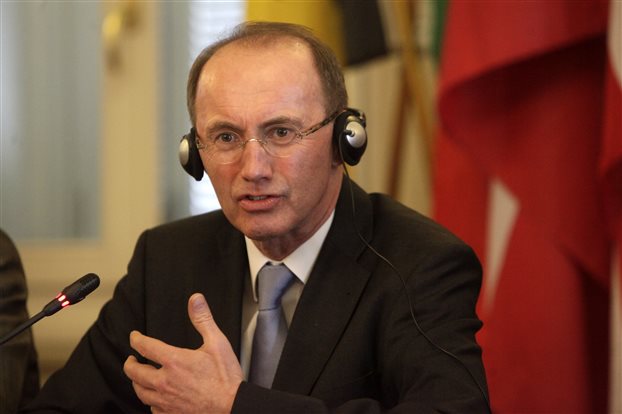Anastasia Balezdrova
Official statements, outright attacks and a translation error put Greek opposition leader Alexis Tsipras in the centre of public debate again.
The controversy was provoked by chairman of the commission evaluating the performance of the supervisory Troika and Member of the European Parliament (MEP) from the European People's Party Othmar Karas, who said that SYRIZA has no programme for the governing of Greece. "We met with Mr. Tsipras in Strasbourg. For over an hour we asked him about his experience as opposition leader, his goals and proposals as well as what he could improve. However, he did not say anything about these issues all the time. All he said was that he supported the European Parliament and would like to be provided with a greater opportunity to intervene in the contacts and negotiations with the Troika. He did not make any other criticism. All he said was that they would support our report. That is all I have to say," said Karas to the members of the Greek Parliament on Wednesday.
SYRIZA was late in responding despite the fact that there were party members in the audience. "Lost in Translation" in the literal sense of the term, due to an error of the translator who had heard and translated the name of Tsipras as "Zypern" (the name of Cyprus in German), MEP Nikos Houndis and three party deputies listened to the statement without saying anything. Only later did they realize that Karas had presented his meeting with their leader and released a joint statement, defining in it the Austrian politician as "a follower of Ms. Merkel and Mr. Samaras". Leader of the left-wing platform in SYRIZA Panagiotis Lafazanis had even stated, "If he had said something about Mr. Tsipras we would have expelled him immediately."
A tragicomic part of the story is that Othmar Karas stated to a journalist who visited him later at the hotel where he is staying, "I could not have met with a state."
The official denial was not enough for SYRIZA and it continued the dispute during today's press conference of the members of the commission, during which they presented their assessment of the actions of the supervisory Troika.

Photo: tovima.gr
"I do not deny any thing of what I said about Alexis Tsipras yesterday," Othmar Karas told the media today.
In turn, SYRIZA MEP Nikos Houndis protected his party leader, saying that Alexis Tsipras had submitted to the commission members the programme of SYRIZA for the governing of Greece. "In English, because some have written that we have submitted it to them in Greek," he said.
However, the actual role of the defender of SYRIZA leader was played by French MEP from the Party of European Socialists Liem Hoang Ngoc, who is one of the speakers in the commission evaluating the role of the Troika in the Member States that have signed a memorandum of financial assistance.
He presented the programme that Alexis Tsipras had submitted to the commission, stating, "Alexis Tsipras presented a detailed economic and social analysis as well as political proposals in writing."
In turn, Othmar Karas did not deny that Tsipras had actually presented the programme of SYRIZA, adding that he was not in Greece to assess or correct an opposition leader.
As for the subject of the press conference on the role of the supervisory Troika, Karas said that, in his opinion, its work was in favour of Greece. He pointed out that the crisis had not been caused by the Troika as it had been formed as a result of it. "It is a tool that has been created to deal with an unprecedented financial crisis. At European level, we were not prepared to cope with it because we did not have the appropriate mechanisms".
Karas said that the report of the commission would launch a debate on the establishment of such tools in the European Union, stressing that this would require time because European treaties would have to be changed. "Meanwhile, the Troika must finish its work in Greece, as it did in other countries," he added.
His colleague from the Party of European Socialists pointed out that the European Union was not prepared to deal with the crisis and warned that the policy of budget cuts would continue for decades if the Greek debt were not haircut.

Far more moderate MEP of the European Green Party Philippe Lamberts said that "there shouldn’t be a Troika in the future but a European mechanism for resolving financial crises." He added that one of the mistakes in the Greek programme is "the lack of justice because the financially weaker people take on a heavier burden". According to him, in the future, measures should be taken to ensure that not only an over-indebted country should assume the responsibility for this but also its lenders.